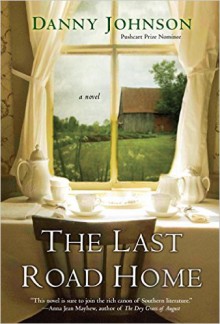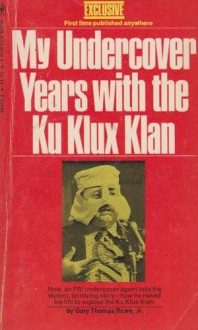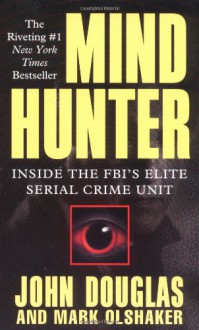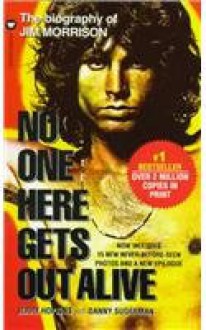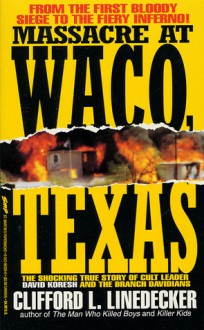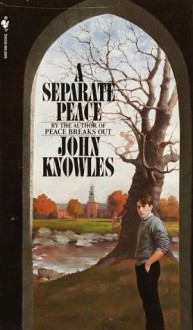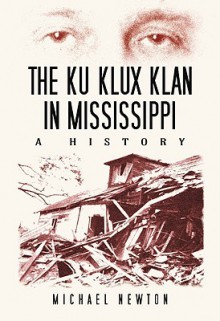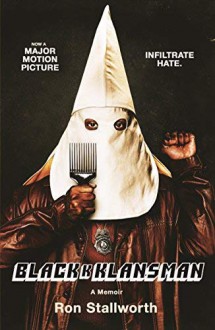
In this memoir, Ron Stallworth writes about becoming the first black detective in the Colorado Springs Police Department and doing a bit of undercover work investigating the Black Panthers before eventually becoming deeply involved in an investigation into local KKK activities. And by "deeply involved," I mean that he accidentally ended up in an undercover investigation as the voice of a white man named Ron Stallworth who was supposedly interested in joining the Klan. He communicated with KKK members over the phone, while a narcotics officer named Chuck acted as the face of white Ron Stallworth when face-to-face meetings were necessary.
I bought this, even though I almost never read memoirs, because this case sounded bonkers and because it was set in Colorado Springs, one of the primary places I grew up. I had seen previews for the movie but didn't immediately realize it was based on a book, and I somehow missed that it was set in Colorado Springs. Since it didn't seem likely that the movie would be shown in my area (it wasn't), I figured I'd give the book a shot.
For the most part, I enjoyed this, and I'd recommend that anyone with a connection to Colorado Springs read it. It was a fascinating piece of the city's history, and although I'm too young to have been in the city at the time it took place, I still enjoyed seeing places mentioned that I knew and/or had been to before.
There was a lot of stuff here that I didn't know. For example, I hadn't known about the grip that the KKK had on Colorado politics in the 1920s and 1930s, or that they had such a huge presence in Denver in particular. I went to both middle school and high school in Colorado and don't remember any of this coming up. I suppose this information could have been covered and I just missed it (history didn't generally interest me), but I'd have thought this kind of thing would have stuck with me.
I enjoyed the times when Stallworth poked fun at the KKK, and there were a few moments in the investigation that made me outright gasp. I wonder how much of it made it into the movie (I still need to watch it). There was a bit involving a KKK application that I imagine would have looked overdone onscreen - I still can't believe that Chuck and the other officer got out of there without any of the KKK members figuring anything out or growing suspicious.
The book's organization was a little confusing, to the point that it was sometimes difficult to follow the case's timeline. I had thought that Stallworth was writing about events relatively chronologically, but this didn't turn out to be the case. For example, on page 84 of my copy of the book, Stallworth was asked by those who knew about his investigation to show off his KKK membership card (which struck me as risky - was it a good idea for so many people to know about the investigation and for Stallworth to show off the card? what if any of those people were secretly KKK members?). Four pages later, Stallworth was calling David Duke to ask about the status of his membership card. There were a few other moments like this, but this one was the most glaring. I also found his occasional "Officer Ed" rants to be overly sudden and a little off-putting.
There were many things Stallworth wrote about that were still applicable today. At one point, for example, there was an anti-KKK protest, and 20 or so KKK members showed up as counter-protesters. They were initially ignored and didn't even bother to put on their robes until one of them asked a member of the media if they'd like a story and the person said yes. After that, it became a media feeding frenzy. As Stallworth wrote:
"The media all too often unwittingly creates the very news it reports because of its zeal to get a story. This only benefits the person or subject being covered and gives them or it a power neither deserves." (126)
It's the kind of thing you can still see in play today, as the media gives screen- and air-time to white supremacists who wouldn't otherwise have that significant of a platform. That said, there were times when I very much disagreed with Stallworth's interpretations, particularly his thoughts on "Antifa" (his decision to capitalize it, not mine).
I wonder whether the movie faithfully stuck to the book's ending, or whether it embellished things a bit? If this had been fiction, the ending would have been deeply disappointing -
instead of coming to some sort of satisfying conclusion, complete with arrests and whatever else, Stallworth was ordered to close the investigation. (I wondered at the legality of what he did to get the documents he eventually used in order to write this book. I assume he wouldn't have gone ahead with the memoir if possessing and using those documents could still have gotten him in trouble, but I honestly don't know.)
All in all, I'm glad I read this, despite my issues with some of it.
Extras:
Several pages of black-and-white photos of documents, items, and photographs relating to the KKK investigation and the beginning of Stallworth's career as a police officer.
(Original review posted on A Library Girl's Familiar Diversions.)

 Log in with Facebook
Log in with Facebook 
